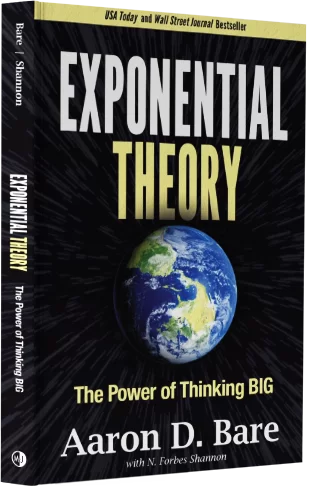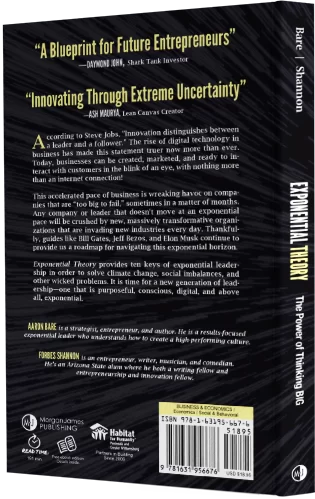“Innovation distinguishes between a leader and a follower.” — Steve Jobs
With the rise of digital technology, business moves at unprecedented speeds, now an exponential pace. This pace is wreaking havoc on the business landscape as we know it. Disruption has brought “too big to fail” companies to their knees in a matter of months. It has made some industries obsolete.Any company or leader that doesn’t move at an exponential pace will be crushed by the new, massively transformative exponential organizations. These organizations are quickly expanding their purpose and invading new industries every day. Guides like Bill Gates, Jeff Bezos, Elon Musk, and more continue to provide us a road map for navigating the exponential horizon.
Through a collection of ten keys of exponential leadership, authors Aaron Bare and Forbes Shannon have created a formula to navigate the disruption. Exponential leadership–combined with emerging technologies, change, and disruption–will not only disrupt the world but will save it.
It is time for a new generation of leadership. A leader that is purposeful, conscious, digital, and above all, exponential. Join us for a journey to re-imagine innovation.
Exponential Theory Outline
Which Do You Want First, the Good News or the Bad News?
The good news is, the future is bright. The bad news is the present is not.
With the rise of digital technology, business moves at unprecedented speeds, now an exponential pace. This pace is wreaking havoc on the business landscape as we know it. Disruption has brought “too big to fail” companies to their knees in a matter of months. It has made some industries obsolete.
Any company or leader that doesn’t move at an exponential pace will be crushed by the new, massively transformative exponential organizations. These organizations are quickly expanding their purpose and invading new industries every day. Guides like Bill Gates, Jeff Bezos, Elon Musk, and more continue to provide us a roadmap for navigating the exponential horizon.
Exponential Theory provides ten keys of exponential leadership, and authors Aaron Bare and Forbes Shannon explain why the world must employ them in order to solve the most alarming problems. It is time for a new generation of leadership-one that is purposeful, conscious, digital, and above all, exponential.
Join us for a journey to reimagine our future.
Chapter One: What is Exponential Theory?
Imagination is the most powerful force in the universe. – Albert Einstein
Exponential Theory: The Power of Thinking Big will examine a variety of companies that are seeking to solve big problems and have become more conscious than other companies focused on just profit.
In return, these companies have grown beyond comprehension.
Their leaders have their eyes on impacting a billion people and understand the importance of their role in the planet, in assisting in human rights, and in living up to a massive purpose that solves an equally big problem. When people work on projects that focus on impacting a billion people, they are forced to think about the system rather than just satisfying one group of customers.
At this level, entrepreneurs and innovators are starting to focus on universal problems and change the way the system works.
Therefore, these future Goliaths are starting to do the right thing, even when no one is looking.
Chapter Two: Embracing the VUCA World
It is not the strongest species that survive, nor the most intelligent, but the ones most responsive to change.
– Charles Darwin
The United States Army and its leaders were troubled: in 1987, the Cold War imploded in Afghanistan into a theater of disillusionment.
The volatility in Afghanistan required military leaders to create a shared vision that extended beyond the immediate chaos into the future of what the country could be.
During times of uncertainty, leaders sought new levels of understanding of the Afghan people and their needs in order to properly assess the situation and move forward. This meant better listening, empathy, and accepting critical feedback from those most affected by the civil war.
The complexity of the war expanded leaders’ horizons by forcing them to rethink aspects they might previously have ignored, like the difficult combat terrain or the large number of civilians in between them and the enemy. Leaders needed to create clarity in the complexity.
Lastly, ambiguity forced military leaders to be agile and flexible, so that they could adapt to the unpredictable nature of the changing war. The four facets of VUCA guide military and exponential leaders alike by focusing on traits necessary for success in today’s world.
Chapter Three: Thinking Exponentially
The greatest shortcoming of the human race is our inability to understand the exponential function. – Albert Allen Bartlett
To better understand exponential growth, here’s a short story.
A little girl is negotiating her allowance with her parents. “Just pay me a penny and double my pay every week.”
Sounds easy enough. At first glance, this sounds like a great deal.>
By week four, she’s only making eight cents a week. Her parents still feel like it’s a good deal.
After two months, she’s making $2.56 a week.
In six months, she’s making $335,544.32 a week, and after one year, her earnings are equal to the GDP of the United States of America.
Exponential growth is a game changer. This is why traditional companies are not able to compete with exponential companies.
Chapter Four: Digitizing the Model
Technology is exponential, yet humans are linear. – Gerd Leonhard
Kodak is an epic example of what happens on the ugly side of disruption.
Kodak was a camera and film photography giant. In the 1990s, they had $19 billion in sales and over 145,000 employees worldwide.
Then the film industry became digitized with the advent of the digital camera. In 2012, Kodak filed for bankruptcy.
Here’s the unfortunate part of that story: Kodak invented the digital camera.
Chapter Five: Becoming a Tech Company
Every company is now a technology company. – Gary Shapiro
The Pizza and Coffee Wars
As disruption through digitization continues to spread, it provides companies with opportunities to capitalize on the digital habits of their customers.
The brands that can make the customer experience a digital one wields a major advantage over their competitors, regardless of industry.
Domino’s Pizza and Starbucks Coffee are two brands that effectively capitalized on changing customer habits, and as a result, are now titansin their respective food and beverage industries.
Chapter Six: Finding the Massive Transformative Purpose
10,000,000,000,000,
000,000,000,000,
000,000,000,000,000,
000,000,000,000,
000,000,000,000,000,
000,000,000,000,
000,000,000,000,
000,000,000 – Definition of a Google, 10^100
The New Toothbrush
The internet is much simpler than we think.
Most people use the internet to do one of the following: search, browse, check email, and/or use social media (including posting photos or watching videos).
Apps used for accessing and sharing information across the internet have been dubbed “killer apps,” because of the massive disruption each one has caused.
For any app, being an industry leader is tremendously powerful.
Google leads in four of five major areas.
Chapter Seven: Launching Disruption
Here’s to the crazy ones. The misfits. The rebels. The troublemakers. The round pegs in the square holes. The ones who see things differently . . . While some may see them as the crazy ones, we see genius. Because the people who are crazy enough to think they can change the world, are the ones who do.” – Rob Siltanen
Timing is Everything
No other event in the brief history of the exponential world was as perfectly timed as Apple’s iPhone release in 2007.
This moment was so important that we argue that technology will be defined as pre-iPhone and post-iPhone.
The iPhone was a major catalyst for mass digitization and mobilization of technology.
This was not just another product launch; rather, Apple launched disruption that would forever change the world.
Chapter Eight: Leveraging the Viral Loop
If you are on social media, and you are not learning, not laughing, not being inspired, or not networking, then you are using it wrong. – Germany Kent
The Social Network Wars
The stories of Facebook’s beginning are etched into pop culture lore.
A drunk undergrad, Mark Zuckerberg, created a crude hot-or-not game comparing Harvard coeds (dubbed FaceMash) that crashed the Harvard internetnetwork with its popularity in a few hours.
He then (allegedly) stole the idea for Facebook from fellow classmates and rowing Olympians, the Winklevoss twins, who sued Zuckerberg and won.
That only added to his legend, complete with his infamous drunk coding binges and all-night parties after he dropped out of Harvard and moved to Palo Alto.
He wore flip flops and hoodies to U.S. depositions.
There is a lot of myth in the creation of Facebook, but one thing is certain: Facebook has won the social network wars, for now.
Chapter Nine: Playing the Long Game
If you double the number of experiments you do per year, you’re going to double your inventiveness. – Jeff Bezos
Not Just Another Book Company
Exponential companies like Amazon begin in a shroud of deception.
When Amazon launched, did any of us think that an online book retailer would take turns with Google, Apple, and Microsoft as the wealthiest company in the world?
Highly doubtful.
Chapter Ten: Executing the MVP
When something is important enough, you do it even if the odds are not in your favor. – Elon Musk
The Exponential Leader
There’s a legendary story that after Elon Musk sold PayPal, he netted $180 million. He was rich beyond most people’s wildest dreams.
Immediately, Musk invested all the money he made into three of his companies—$100 million into SpaceX, $70 million into Tesla, and $10 million into SolarCity.
Only after his major investment did Musk realize he was short on rent.
How can someone be that crazy to take everything as he was set for life, and risk it all?
Elon Musk thinks differently. He is deeply rooted in exponential theory and the clearest example of big thinking in our lifetime.
Chapter Eleven: Accelerating Innovation
Because the world is changing, we can never assume that the way we have done things in the past is adequate for the future.” – Yvon Chouinard
Jumping to Hyperdrive
Somewhere in the Yucca Mountains of Nevada, near Groom Lake sits a top-secret US Air Force base.
Built in the 1950s, the base, shrouded in secrecy, has been the linchpin of dozens of conspiracy theories. It is a military test center in the desert that the CIA didn’t even publicly acknowledge existed until 2013.
Though we (still) don’t know anything specific about what they do at Area 51, the idea of setting up a top-secret lab outside of headquarters and day-to-day operations is a model we have seen repeated in many industries.
Apple, a company that continues to thrive on secrecy and launch unexpected ideas, has its own Area 51 called the Pirate Ship.
Chapter Twelve: The Great Reset
Our deepest fear is not that we are inadequate. Our deepest fear is that we are powerful beyond measure. -Marianne Williamson
A New Beginning
As the Earth took a deep breath in 2020, we got a glimpse into the much-needed reset.
The environment glaringly showed the benefit of a reset during the COVID-19 pandemic.
Small changes in human habits, such as orders to work from home, drastically improved many parts of biodiversity.
In March 2020, after only four days of quarantine, Los Angeles recorded the best air quality in 40 years.



